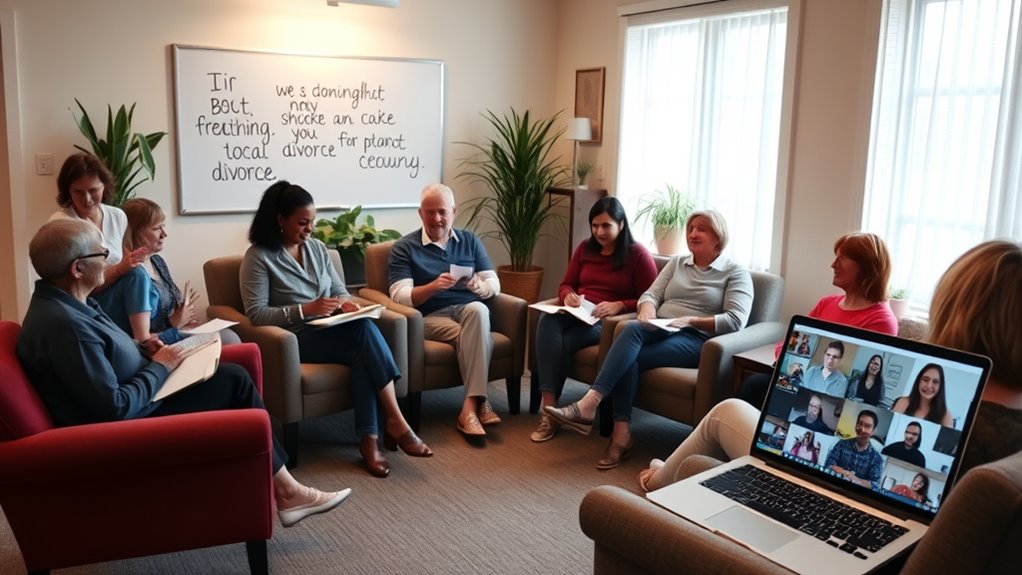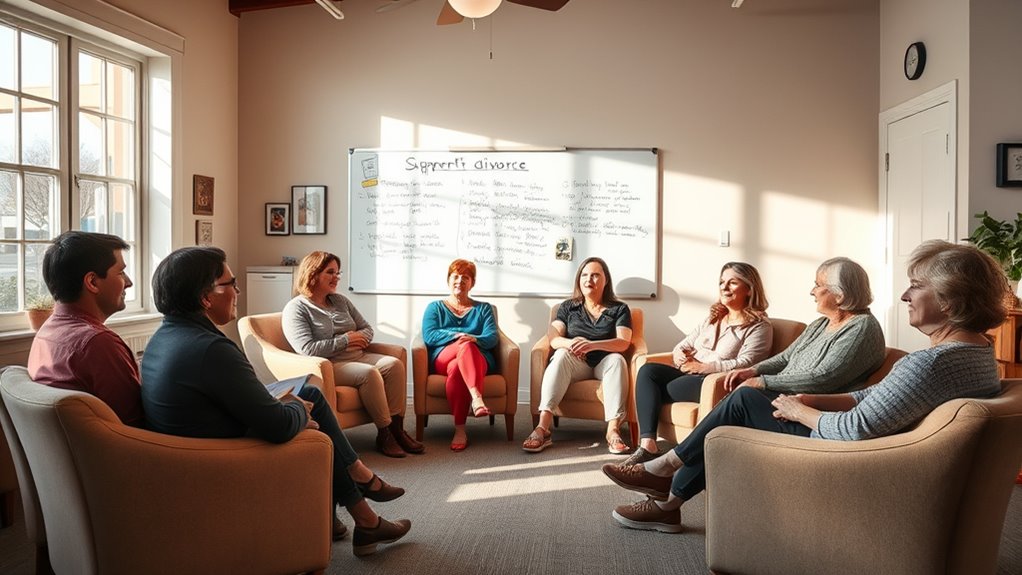Divorce support groups can offer you emotional help and a sense of community both online and nearby. Online options provide flexibility, anonymity, and access to members worldwide, while in-person groups give you face-to-face support and shared experiences. You might find peer-led forums, therapist-led sessions, or faith-based groups that suit your needs. Continuously exploring your options can help you discover the right support system to guide you through this difficult time.
Key Takeaways
- Explore online platforms like SupportGroups, Circles, and MensGroup for accessible, anonymous divorce support communities.
- Search local community centers, religious organizations, or clinics for in-person divorce support groups near you.
- Consider peer-led or therapist-led groups to match your comfort level and recovery needs.
- Use online directories and mental health resources to find specialized groups, such as faith-based or co-parenting support.
- Joining both online and local groups can provide comprehensive emotional support and foster community connections.

Are you steering the difficult journey of divorce? If so, you’re not alone, and support can make a huge difference. Divorce support groups exist to help you navigate the emotional and practical challenges that come with ending a marriage. These groups provide a safe space where you can share your experiences, feel understood, and gain valuable coping strategies. Whether you’re overwhelmed by grief, stress, legal concerns, financial worries, or parenting struggles, support groups address a wide range of issues to guide you through each phase of recovery. They’re available in both online and in-person formats, allowing you to choose what fits your needs and comfort level best. Online groups offer the flexibility of participating from anywhere, often 24/7, and enable anonymity, which can be especially helpful if you value privacy. In-person groups, on the other hand, provide face-to-face interaction and a sense of community, though they may require more scheduling effort and might lack the privacy some prefer.
Support groups offer compassionate, flexible help for navigating divorce’s emotional and practical challenges in both online and in-person settings.
There are different types of divorce support groups, each designed to serve specific needs. Peer-led forums encourage open sharing among individuals who are going through similar experiences, fostering a sense of camaraderie. Moderated groups, led by therapists or trained facilitators, focus on structured recovery and providing professional guidance. Specialized groups target particular populations, such as faith-based communities, men-only groups, or those centered around co-parenting or emotional healing. These variations help guarantee you find a group that resonates with your personal background and preferences. Research indicates that participation in support groups can significantly reduce feelings of isolation and promote emotional healing after divorce. Additionally, joining a support group can help you develop healthier coping skills and resilience to face future challenges.
Online options include platforms like Circles, which offers professionally facilitated audio chat groups tailored for men, emphasizing mental health and community support. MensGroup hosts regular video meetings focused on building brotherhood and offering personal growth resources. SupportGroups provides forums for emotional support, both public and private, on divorce-related topics. DivorceCare, a faith-based online or in-person program, integrates spirituality into healing, helping participants find strength through their faith. Many of these online groups are accessible worldwide and protect your privacy by allowing participation without revealing your identity, making it easier to seek help without concern about exposure.
Faith-based support groups blend spiritual growth with mental health support, helping you reconnect with your faith, find forgiveness, and feel less isolated. These groups often normalize the divorce experience and foster a sense of belonging in a community that understands your emotional and spiritual needs. Regular participation in such groups can deepen your healing process and build resilience, both emotionally and spiritually. The benefits of joining a support group are backed by research, which shows that combining support groups with therapy can profoundly improve your emotional well-being within months. They also help improve communication with children, promoting resilience in your family. Sharing your story, gaining practical tools, and connecting with others who understand what you’re going through can help you rebuild your confidence and move forward with hope and strength. Engaging in these groups can also be beneficial for emotional healing and long-term recovery after divorce.
Frequently Asked Questions
How Do I Find Local Divorce Support Groups Near Me?
To find local divorce support groups near you, start by using online directories like DivorceCare, Psychology Today, or Meetup. Enter your city or ZIP code to filter results, then check each group’s focus, schedule, and format. Contact the organizers directly to confirm current meetings and details. Consider the group size, in-person or virtual options, and whether the focus aligns with your needs to find the best fit.
Are Online Support Groups Confidential and Safe?
Think of online support groups as a locked safe—confidential and secure. You can trust that your personal stories stay private, thanks to features like pseudonyms, privacy settings, and moderator oversight. By following safety tips, like avoiding phishing links and using strong passwords, you protect yourself further. These groups foster open sharing and emotional support, creating a safe space where you can heal without fear of judgment or exposure.
Can I Join a Support Group if I’M Still Legally Married?
Yes, you can join a support group while still legally married. Many groups welcome participants who are separated or considering divorce because emotional support is essential during this time. Joining early helps you prepare emotionally, manage stress, and gain clarity. Just make sure to choose a group that matches your needs, verify the facilitator’s credentials, and consider whether online or in-person options work best for you.
What Types of Issues Are Addressed in Divorce Support Groups?
In divorce support groups, you’ll find assistance with emotional struggles like grief and anger, much like Sarah, who felt lost after her divorce. These groups address practical issues such as managing finances, co-parenting, and steering legal hurdles. You’ll also explore relationship rebuilding, setting boundaries, and handling social stigma. Many find comfort sharing their stories, gaining strategies, and discovering they’re not alone in facing these complex, life-changing challenges.
How Long Do I Need to Participate in a Support Group?
You typically need to participate in a support group for about 8 to 12 weeks, especially if it’s a structured program. The exact length depends on your goals, how quickly you adjust, and your personal needs. Some people stay longer if they find ongoing emotional support helpful, while others finish once they’ve achieved their coping goals. Your facilitator will help determine when you’re ready to move on.
Conclusion
Joining a divorce support group can be a game-changer during tough times. Did you know that 80% of people who participate in support groups report feeling less lonely and more hopeful? Whether online or locally, these groups offer a safe space to share, heal, and rebuild. Don’t hesitate to seek help—you’re not alone, and taking that first step can lead to renewed strength and brighter days ahead.










